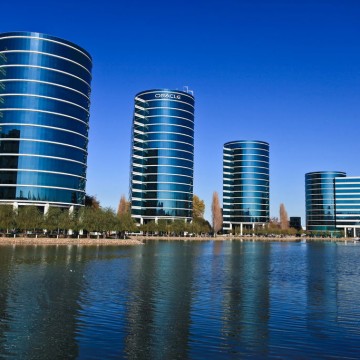Cover Oregon Lawsuit Might Be Wakeup Call Oracle Needs
Thursday, December 04, 2014
Oracle Headquarters, via Wikimedia Commons
It is unlikely that Cover Oregon will prevail in their claims against Oracle, especially after the eviscerating internal report by Clyde Hamstreet came to light in October. But the marketplace might be more damaging to the company than state-sponsored legal attacks.
Oracle's fight for survival will rest on the old fault line of open-access technology on the one hand and proprietary software/hardware technology on the other. These were the concepts behind some of tech’s most legendary industry conflicts, big fight between VHS and Betamax, Microsoft and Apple and now Apple and Android/Google.
Oracle has been facing serious market challenges that have been slowly building for the last 20 years. Like the proverbial frog in tepid water, where the temperature is slowly being raised to a boiling point, Oracle has been impassive in the face of tectonic shift in the software universe.
Thankfully for Oracle, it appears that Larry Ellison has understood the importance of the Cover Oregon problem. Several months ago he resigned as CEO and appointed himself Oracle’s Chief Technology Officer.
Ellison is the last man standing from the software wars of the last 30 years. While Bill Gates is playing bridge and Steve Ballmer is buying basketball teams, Ellison is still at Oracle, in the trenches and as aggressive as ever. In his sixties, he crewed on the America’s Cup boat that brought the cup back to San Francisco and won so spectacularly last year. Ellison is not a man that is in the habit of losing when the stakes are high. And stakes couldn’t be higher for Oracle.
The company is facing several important challenges, the seeds of which trace back over decades and is central to both Oracle’s early success and recent vulnerability. Oracle started in 1977 selling custom software to the government, eventually becoming the world’s largest mini-computer relational database vendor.
For the uninitiated, a relational database is what is used to keep track of important information such as online payment transactions or the inventory available to sell on a website. While there are many open source alternatives today, during the 1980’s and 1990’s no such free solutions existed.
Unlike Microsoft, Ashton-Tate and Adobe who sold software through retail distribution, Oracle sold their software directly to the IT departments of medium sized companies.
The Oracle direct sales force was legendary. From 1980- 1990 revenue doubled each year. The top Oracle field salesperson could make upwards of $1 million a year.

Cover Oregon logo
With the purchase of Sun Microsystems, Oracle became one of the few companies still out there that sold large-scale data systems to companies and governments. That means they bundle the software, the data storage servers and the support services needed to run big data computer systems all together in a one-stop shop. The Oracle bundle, however, is becoming increasingly less useful as web technology improves and the cloud takes over.
As an analogy, one might view the cloud as a large drone air force and Oracle as last guy selling jet fighters. There might be a market for piloted fighter aircraft, but the trend is inexorably towards less expensive automated systems that remove the hands-on professional from the equation.
The cloud, in its full manifestation, presents a mortal threat to this license fee/bundle revenue stream and there is no easy way to make up the difference. Central to Oracle’s pricing strategy has been the argument that the value per seat of Oracle software increases with the total number of users able to access the same data and application. In network terms this is known as Metcalf’s law, from 3Com founder and Ethernet inventor Dr. Robert Metcalf.
Cloud based computing virtually removes the Metcalf’s law argument from the discussion. There are many ways to split up databases to run on the cloud that are easier to manage and higher performing than traditional relational databases. In other words, Oracle’s high-end custom build systems are competing with cloud-based solutions that have no licensing fee, and are better integrated with the web.
For example, for the same price as an Oracle high-end hardware database setup, one could cobble together 20,000 credit card sized Intel Edison systems, running as a distributed Google server, and theoretically process all of Google’s search traffic for the entire world.
While Oracle might have great hardware and software for the old platform such technology might be more akin to a carbon fiber buggy whip.
While, Kitzhaber may have been stupid for buying the last horse buggy sold before the Model-T rolled out, the current fight with Oregon may be good for Oracle. The stakes are so high in the lawsuit that Oracle now has no choice but adapt or die, which, sooner or later, is a choice every dinosaur needs to face.




Follow us on Pinterest Google + Facebook Twitter See It Read It